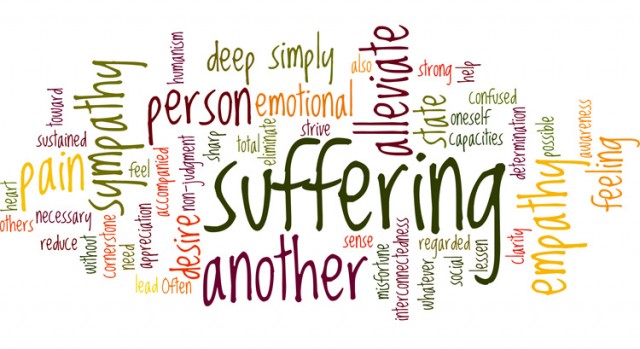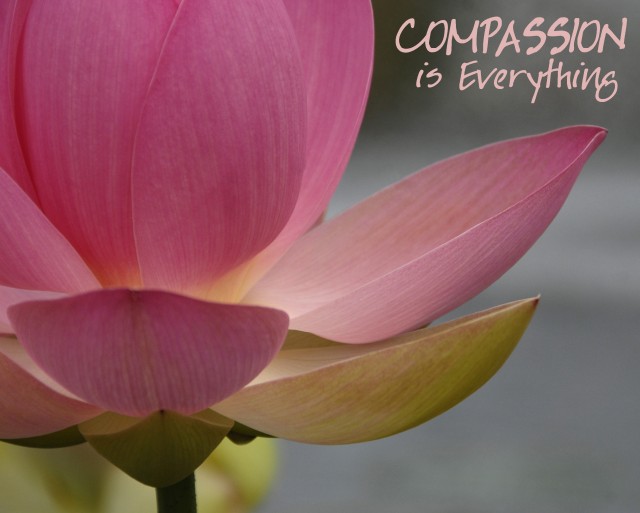Compassion is a word often misunderstood.
After hearing the Dalai Lama speak a couple of years ago, I started exploring the true meaning of compassion. He emphasized how important it was to show compassion towards our children from birth. At first, one might ask, what parent does not show compassion towards their children? Even the most loving parent, though, can sometimes not identify with what their child is going through. Telling them not to cry, to be a man (or woman), don’t feel that way, it will be alright. I found that I did not truly understand what it means to have compassion. The roots of the word mean “to suffer with” and many think this means that we take on another person’s suffering and try to fix it. But…
Compassion is not pity. Compassion is not taking on the weight of the world.
I began to get a different picture of compassion while reading Diamond Heart: Book One by A.H. Almaas. He sees the common definition – a desire to alleviate another’s suffering – as “the elementary level of compassion.” At this emotional level, we want to help and helping makes us feel good.
On a deeper level, though, compassion is about seeing the truth and the truth can be painful. This more mature compassion “helps us to tolerate the hurt of seeing the truth.” When someone shows us compassion, we trust them. We can be vulnerable and show them the truth of our pain. Their compassion does not take the pain away, but makes it easier to bear because we are not alone.
True compassion lets someone know that you recognize their suffering. True compassion does not try to fix anything. True compassion helps the person suffering not feel so alone.
I just finished a wonderful book by Gail Straub called The Rhythm of Compassion: Caring for Self, Caring for Society. It includes all kinds of exercises to help you get to the root of your own compassionate self. Often, the areas where you were not shown compassion are clues as to where you can contribute to a more compassionate society. She says that mature compassion requires:
- A quiet mind
- An open heart
- Presence
- Simplicity
All of these things are about creating the space for compassion to develop. Notice that the first two are about you – caring for self. You must create a quiet mind and open heart in yourself before you can care for others. A quiet mind can be developed through meditation, prayer, yoga, or walks in the woods.
How do you quiet your mind?
Opening your heart is realizing that suffering is universal. We all experience it at times, and remembering our own helps us understand it in others.
How do you open your heart?
Presence grows from the previous two. It means learning to listen and just be with someone in their suffering, without trying to fix anything.
When are you present to others?
I found that this is an area I really need to practice. When faced with suffering, I tend to have one of two reactions – withdraw or try to fix it – and I’m sure I’m not alone in that. True presence, without judgment, is a rare skill.
Simplicity comes from presence. As we sit with someone in their suffering, and let go of our need to fix, any action that is helpful will become apparent. As Mother Teresa said, “do small things with great love.”
A few years ago, I had an acquaintance who was dying of cancer. Although I did not know her well, we had a good connection and I felt compelled to be with her in her dying days. She had a strong support group, people who brought her food, gave her manicures, and washed her hair. I felt like I did not do enough because mostly we would just go out for lunch. Not long before her death, she sent me a beautiful card (that I still have), telling me that I did not need to worry about what to do for her (I did not tell her that I worried about this). She said that my presence when we had lunch together was one of the best gifts she had ever received. Receiving that card was one of the greatest gifts I ever received.
Related Reading
** Books mentioned have Amazon affiliate links, meaning I make a few cents if you purchase through my link. I only recommend books that I’ve read.

